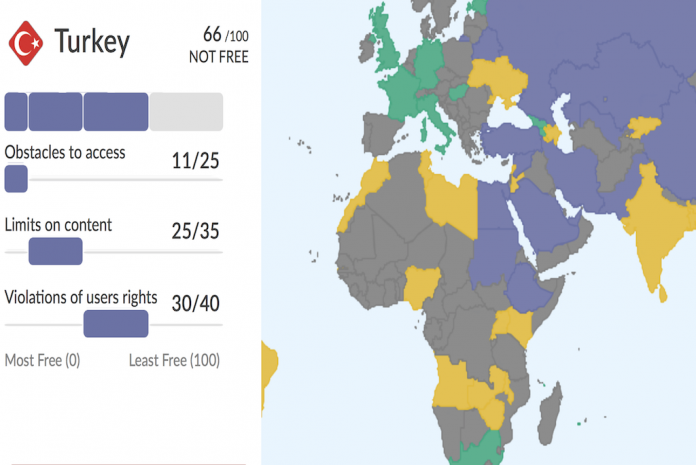Turkey’s restrictive Internet policy and digital surveillance continued to grow last year, with Turkey scoring 66 out of 100 on Internet freedom, according to an annual report released by Freedom House.
Freedom House, a democracy watchdog group mainly financed by the US government, said in its report titled “Freedom on the Net 2018” that Internet freedom in Turkey remained highly restricted in the past year, which was characterized by increased self-censorship, a growing list of blocked news sites and sweeping arrests for criticizing military operations or the president. The report tracked Internet freedom from May 31, 2017, to June 1, 2018.
Turkey ranked among the countries with the highest number of content removal requests sent to Twitter and Facebook as reported in transparency reports, Freedom House said.
This year saw fewer instances of network shutdowns, which had denied Internet access to large swathes of the population during security operations in the country in which thousands of people were arrested for their alleged links to plotters of a failed coup attempt in July 2016, the think tank said. Several news outlets and citizen journalism websites were blocked, and Wikipedia remained inaccessible during the report coverage time.
“Without meaningful checks on executive power, President [Recep Tayyip] Erdoğan and his cabinet have enacted numerous decrees to arrest tens of thousands of people allegedly linked to the 2016 coup attempt, suspend or dismiss individuals from their jobs, block websites, shut down communication networks, and close civil society organizations and news outlets.”
The state of emergency that was declared immediately after the coup attempt was lifted in July 2018, but the government’s actions since the coup attempt will have lasting damage on Internet freedom, according to Freedom House.
The mass arrests had peaked when criticism of Turkey’s military operation in Syria’s Afrin district had begun, and tens of thousands of journalists and other individuals were put behind bars for online commentary, the report said.
On top of criticizing government policies or Turkey’s military operations, insulting President Erdoğan on social media is another crime punishable by up to four years in prison. According to statistics released by the Interior Ministry, security forces initiated investigations into almost 50,000 social media accounts during the coverage period for sharing what was deemed to be terrorist content online, resulting in over 20,000 legal actions taken, said Freedom House. (SCF with Ahval)















